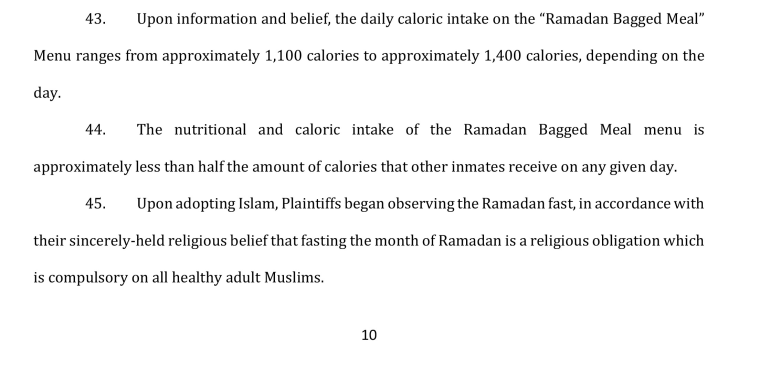The Michigan chapter of the Council on American-Islamic Relations (CAIR-MI) announced on Wednesday that it has settled a lawsuit involving Muslim inmates at four Michigan Department of Corrections (MDOC) facilities who were denied sufficient nutrition when they fasted during Ramadan.

The lawsuit, filed in 2013, claimed that Muslim inmates received as little as one-third of the suggested intake of 2,600 to 2,900 calories during Ramadan in 2011 and 2012. Plaintiffs were further denied their requests for a halal diet, which includes food prepared in accordance with Islamic law, court documents allege.
“This issue is simply a broader problem that Muslims face all throughout the country,” Dawud Walid, executive director of CAIR-MI, told NBC News. “And also, the unfortunate reality is there are some people in government who really believe America is a Christian nation, and based upon this premise are not as willing to accommodate the bona fide requests of people in corrections based on their religious beliefs.”
One of the plaintiffs in the lawsuit said that he was on multiple occasions served breakfast after sunrise, making him unable to eat the meal, as Muslims commonly fast from sunrise to sundown during Ramadan, according to the lawsuit.
“Defendants have imposed a substantial burden on Plaintiffs’ exercise of Islam within the correctional facilities,” the lawsuit said, arguing that inmates were forced to violate their core beliefs to receive the recommended daily caloric intake.
"The unfortunate reality is there are some people in government who really believe America is a Christian nation, and based upon this premise are not as willing to accommodate the bona fide requests of people in corrections based on their religious beliefs.”
Since the suit was filed, MDOC has increased the amount of food it provides to Muslim inmates to meet the recommended number of calories set by the Department of Health and Human Services and Department of Agriculture, according to CAIR-MI.
“We welcome the successful settlement of our lawsuit with the MDOC and hope that this case will send a message to correctional facilities nationwide to respect prisoners’ rights to free exercise of religion and to be free from cruel and unusual punishment,” Lena F. Masri, CAIR national litigation director and former legal director of CAIR-MI, said in a statement.
Prior to the settlement, MDOC officials had filed a motion requesting dismissal of the complaint, arguing that they were entitled to qualified immunity, which shields government officials from liability for damages caused by discretionary actions unless they violated a “clearly established” law or constitutional right.
In September, however, the court denied the motion, stating that a reasonable official would have known that if plaintiffs received one-third the amount of daily calories recommended during the month-long Ramadan fast, it would not be enough to keep them in good health. This practice violated plaintiffs’ first and eighth amendment rights, the court ruled.

Specifics of the settlement were not immediately available and MDOC did not respond to NBC News requests for comment.
The lawsuit is not the first time the MDOC has been faced with complaints from Muslim inmates. In 2009, the ACLU of Michigan filed a class-action lawsuit on behalf of Muslim and Seventh-Day Adventist prisoners for violating their first and fourteenth amendment rights to freedom of religion and equal protection. In this case, a district court judge found that the MDOC violated Muslim inmates’ rights by denying them the ability to attend weekly prayers and Eid meals. The lawsuit was settled in 2013.
Follow NBC Asian America on Facebook, Twitter, Instagram and Tumblr.